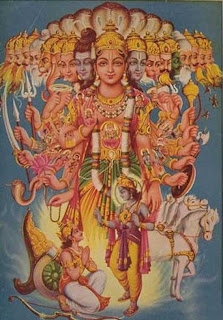

A certain gentleman has asked
the following question:—“If it is certain that we reap the consequences of our
own actions and that our ideas are good or bad according to our past actions,
are we justified in saying that man has no control over his actions and that
the will of God alone is supreme? God can in no way interfere with the fruit of
our actions, why, then should we worship Him?”
It is no doubt true that one
reaps the consequences of his own actions and that his ideas, too, are molded
according to his actions. It is also true that it is the Divine will, guided by
one's innate disposition (which is molded according to one's past actions) that
enables him to do a certain thing. Activity is impossible unless it is backed
by the Divine presence, the Divine energy, the Divine consciousness, the Divine
stimulation and the Divine guidance. It is in this sense that God is ultimately
responsible for all our actions. It is also quite reasonable to believe that
God, though able "to do, undo and re-do a thing" does not enhance or
diminish the fruit of one's actions. But nevertheless it is very necessary to
worship God. Before entering into a discussion of this problem it is essential
to devote some thought to a number of subsidiary questions, viz., "What is
Karma (action)? In what manner is the fruit of actions enjoyed? Whether man is
free in the matter of enjoyment of the fruit of his actions?" and so on.
Hindu scriptures have divided
Karma into three kinds: (1) Reserved (Sancita), (2) Fruit-bearing (Prarabdha) and
(3) Current (Kriyamana). Let us now deal with each type separately.
(1)
RESERVE STOCK
Reserved actions are those that
have been performed during innumerable lives in the past and have been lying indisposed
of. Whatever action one performs with his mind, speech or body is termed as
'current' so long as it is still going on, and is added to the reserved list as
soon as it is finished. To take a homely illustration, a farmer has been
cultivating his fields for a long time and storing the produce thereof in a
barn.
In this way his barn now
contains large quantities of grain of various kinds stored up for a number of
years successively. As soon as the harvest is ripe, a fresh stock of grain is
added to the reserve stock. Now, in this example, cultivation is an action and
the barn full of grain constitutes the reserve stock. Similarly, all actions
that we are performing are Kriyamana (current) so long as they are not
complete, and are transferred to the reserve stock accumulated in the big
store-house of the heart as soon as they are finished.
Out of this huge stock of
accumulated actions, consisting of virtuous as well as sinful deeds, a handful
is taken out to serve one lifetime and this handful of actions which has begun
to bear fruit and which will be exhausted only on their fruit being enjoyed and
not otherwise, is known as Prarabdha (fruit-bearing actions). In this way, so
long as the reserve stock endures, a part of it continues to be taken out as
Prarabdha for being enjoyed in one lifetime. A Jiva know no liberation so long
as this stock of indisposed of actions performed in a number of lives is not
completely exhausted. These accumulated actions supply the impulse to perform
further actions; the impulse is then translated into actions; and the action,
when performed, is transferred to the reserve stock and a portion of it is
taken out as Prarabdha. In this way the stream of Karma is incessantly flowing
and the Jiva is swept along with it. Our mental stuff is also molded according
to our accumulated actions; in other words, it is our accumulated actions,
stored up in the heart, which induce us to perform similar actions again.
The mainspring of all
promptings for action, whether of a Sattvika, Rajasika or Tamasika nature, is
our accumulated actions. Of course, it should be definitely understood that our
accumulated actions simply prompt us to do a thing; they have no power to
compel us to follow a certain course. Our present efforts, which are designated
as Purusartha, constitute the principal factor determining the course of our
present actions. If the Purusartha is in consonance with our accumulated
actions, it lends support to the impulses induced by the latter and gets them
translated into action. If, on the other hand, it is of a conflicting nature,
it succeeds in restraining the impulse. Suppose one who has the vestiges of
evil actions stored up in his mind feels the impulse of
thieving—misappropriating Others' property.
Now, if he is living in good
surroundings and listens to the discourses of wise men and takes recourse to
reflection also, the combined effect of all this would be that the bad impulse
will receive a set-back and will soon die out. Similarly, the vestiges of
virtuous actions stored up in one's mind prompt him to practise charity and
perform other virtuous acts; but the unwholesome advice of his present
associates, who are of an undesirable type, succeeds in curbing and eventually
killing that noble impulse. The long and short of it is that one's present
efforts constitute the principal factor determining the course of his actions.
The noble actions that we now perform as a result of associating with holy men
and entertaining noble thoughts will create noble impressions in the mind,
which will throw the older impressions into the background, so that the latter
will seldom manifest themselves in the form of impulses of a cognate nature.
A farmer's barn contains grain stored up for
several years past and he adds the new crop also to the old stock. Now, if he
wants to draw from this stock, he will naturally lay his hands upon that which
has been added last of all; for the same would be readily available, having
been heaped upon the previous stock. Even so the impulses for our present
actions are supplied by the impressions left on our mind by our latest actions.
The human mind is a repository of innumerable ideas.
Out of these one would recall
only those ideas more frequently which occupy his mind for the most part at the
present time. Suppose A is given to the service of holy men; but, having fallen
in bad company, he begins to visit theatrical performances, so that he now
mostly recalls the scenes of these performances. Man generally acts, according
to his impulses, unless he engages in pursuits of a contrary nature; the
impressions that are left on his mind by his actions are also of a similar
nature and give rise to similar impulses, which in their turn lead to similar
actions again. The man who frequently visits theatrical performances naturally
recalls the scenes of those performances and feels inclined to enjoy them again
and again. Having secured a company favorable to his inclinations, he visits
the performance again, recalls its scenes later and feels inclined to repeat
the experience and actually does so again. Repeating this process several times
he eventually gives up the noble pursuit of serving holy men and in course of
time forgets all about it. This proves that the impressions created on our mind
by our present efforts in the direction of associating with holy men, listening
to the discourses of wise men and entertaining noble thoughts, and so on, curb
the impulses induced by our past actions and hence it is said that man is
ordinarily free in the matter of gathering a new type of impressions,
modifying the old ones and multiplying or diminishing them.
We owe some of our impulses to
our Prarabdha Karmas as well. Although it is very difficult to single out the
impulses born of our Sancita Karmas from those induced by our Prarabdha Karmas,
it should ordinarily be borne in mind that the impulses or latent desires which
induce us to perform a virtuous or sinful act are traceable to our Sancita
Karmas, while those which make for the enjoyment of pleasure or pain only are
due to our Prarabdha Karmas. Pleasures and pains resulting from this latter
type of impulses may either be mentally experienced by our subtle body (Suksma
Sarira) or they may accrue to us as a direct result of our bodily actions. In
any case, man has no control over the inclinations arising out of his Prarabdha
Karmas.
2.
PRARABDHA KARMAS
It has been pointed out above that a portion
of our Sancita Karmas, which are of a mixed type—virtuous as well as sinful—is
set apart as Prarabdha for being enjoyed in one Life. The fruit of these Karmas
is enjoyed in two ways: (1) through mental Vasanas and (2) through bodily
actions. The pleasure or pain that we derive from the various thought-currents
arising in our mind in dreams and on other occasions in our waking life
constitutes what they call mental enjoyment. Suppose a merchant purchases some
grain and builds hopes of buying a plot of land and constructing a house
thereon provided he is able to make so much profit out of this transaction. He
also pictures to his mind a number of hopeful factors and the very thought
fills him with delight. The very next moment, however, the thought of prices
going down and launching him into a loss makes him uneasy and chills his
spirits. Our mind is constantly swayed by such ups and downs created by our own
imagination, which make us happy or otherwise.
Suppose one enjoys all
amenities of life and there is no ostensible reason to make him unhappy, but
worries of various kinds prey upon his mind and make his life miserable. People
wonder why such a darling of fortune should appear so dejected and depressed.
Likewise those who suffer from wants of various kinds and have every reason to
feel unhappy are sometimes seen as happy as anything. A ray of hope or the
prospect of some future gain brightens for a moment the face of even one who is
bewailing the death of his beloved son. This is another instance of mentally
enjoying the fruit of one's Prarabdha.
We also enjoy Prarabdha Karmas
by coming across things and events which affect us agreeably or otherwise and
thus cause pleasure or pain to us. This enjoyment of pleasure and pain as a
result of Prarabdha Karmas comes into operation in three ways—and they are
technically known as (1) Aniccha Prarabdha (Prarabdha enjoyed involuntarily),
(2) Pareccha Prarabdha (that enjoyed through other's will) and (3) Sveccha
Prarabdha (Prarabdha enjoyed through one's own will).
ANICCHA
PRARABDHA
Aniccha Prarabdha is that
enjoyment of pleasure or pain which comes to us accidentally and of its own
accord without any volition on our part. For instance, suppose one is going to
a certain place and, while he is passing underneath a wall, the wall suddenly
collapses and the man is buried under the debris; or he is struck by lightning
on the way or a tree gets uprooted all of a sudden and fells him down along with
it; or again, the roof of a house falls down and crushes him; or, while he is
holding a loaded gun in his hands, the gun suddenly goes off and he is shot
thereby. Similarly, on the other hand he may stumble on a precious stone while
going on a journey or may discover a treasure-trove while ploughing a field or
meet with some other piece of good luck which neither he nor anyone else sought
for. These are some instances of Aniccha Prarabdha.
PARECCHA
PRARABDHA
Enjoyments and sufferings which
we get through other's will are classed under Pareccha Prarabdha. One's being
assaulted by thieves and robbers while asleep or deliberately persecuted by
anyone else is an instance of the latter type, whereas the thwarting of one's
evil plans by some virtuous man, one's being prevented by a friend or one's
doctor from taking unwholesome or prohibited food, getting money unsolicited
from someone else—these are instances of the former type. In this connection
one thing should be clearly understood. Suppose someone inflicts an injury on
another or commits a burglary in his house. In this case the injury that the
latter receives or the theft that is committed in his house is no doubt a
result of his Prarabdha Karmas, but the man who has inflicted the injury or
committed the theft has perpetrated a fresh action, the consequences of which
he will have to suffer hereafter. For the medium of enjoying the fruits of
one's actions is not determined beforehand. If the medium or instrument is
determined beforehand and if it is previously decided as to what particular
person will commit theft in the house of such and such a man or inflict injury
on the person of such and such a man, the person who commits the theft or
inflicts the injury will escape all blame; for he has done so under the divine
dispensation. Had this been so, why should it have been necessary for the
Sastras to prescribe punishments for such deeds and why should there have been
any provision for retribution?
Hence it will have to be
admitted that the medium of enjoying the fruits of actions is not previously
determined in all cases. An action which involves an injustice or has some
selfish motive behind it, and which is characterized by attachment, is no doubt
a fresh action. Of course, if God wants to utilize the services of some one in
particular for disposing of a particular individual, He can do so in the same
way as a ruler appoints a dutiful executioner to hang an assassin who has been
sentenced to death. It may be that the man who is sent to gallows killed the executioner
in a previous life or he has had no relation whatsoever with him and may only
he performing a righteous act.
SVECCHA
PRARABDHA
Deriving pleasure from coition
with one's wife during the period prescribed for the same, begetting a son or
having no issue, losing one's child, taking pains and bearing hardships in
prosecuting a righteous business, deriving profit from the same or incurring
loss therein or losing the profits once gained—these constitute instances of
Sveccha Prarabdha. The urge that we feel for performing these actions emanates
from our Prarabdha Karmas and the impulse is followed by action. Success or
failure in our undertakings depends on the merits or demerits accruing from our
past actions.
It is no doubt very difficult to trace the
causes of pleasures and pains that we experience as a result of our Prarabdha
Karmas. Even by recourse to a minute analysis and reasoning of various kinds it
is extremely difficult to say definitely what particular action performed in a
previous life is responsible for a particular pleasure or pain experienced by
us now or whether a particular action committed in this very life has been
transferred from the Sancita to the Prarabdha list and has brought about this
experience.
Suppose someone performs the Putresti
sacrifice (a sacrifice for obtaining a male issue) or some other sacrifice for
acquiring wealth and obtains a son or wealth immediately after the sacrifice is
over. Now it is difficult to decide whether the sacrifice he has just performed
or some other action performed by him in a previous life is responsible for his
obtaining the son or wealth. It is just possible that he may have obtained the
son or riches as a reward for some meritorious deed performed by him in a
previous life and the fruit of the sacrifice now performed may accrue to him
later on, or it may be that some defect in the performance of the sacrifice may
have nullified its effect.
Suppose a patient undergoes
treatment for curing his ailment and is cured. Here it is difficult to judge
whether the cure has been brought about by the treatment or whether the period
of Bhoga (suffering) being over, the cure has come of its own accord and it
appears by coincidence that it has been brought about by the treatment.*
Nevertheless it must be understood that, whatever may be the case, every event
or experience affecting us agreeably or otherwise is a result of actions
performed of our own free will. There are no hard and fast rules to determine
whether the fruit of a particular action will accrue immediately or at some
future date.
The whole thing entirely lies
in the hands of God, a Jiva being altogether helpless in the matter. Those who
commit sins in this life are found happy and prosperous with a number of sons
and plenty of wealth and honour (although many of them might be suffering from
some mental worries and afflictions the magnitude of which cannot be imagined
by us), whereas those who lead a virtuous life are seen suffering from want
(though many of them might likewise be mentally happy), which leads us to doubt
whether there is any such thing as retribution in Divine dispensation. In such
cases it should be understood that they will reap the fruit of their present
actions in a future life and that they are at present enjoying what they earned
in a previous life.
It is said that the fruit of an
action which is very powerful accrues forthwith, while that of ordinary actions
accrues rather late. But even this rule does not appear to hold good in every
case; hence it must be said that we human beings cannot trace the cause of a
particular pleasure or pain experienced by us of our own free will, on the
strength of reasoning and logic. Besides God, Who is the controller of the
whole universe and has knowledge of the past, present and future, only Yogis
who can focus their mind on their actions and their fruit can know something by
grace of God through their Yogic powers.
3.
CURRENT ACTIONS
Fresh actions, whether good or
bad, that are performed of one's own free will are known as Kriyamana or current
actions. The principal factor determining our present actions is our Sancita
Karmas; in some cases one's own Prarabdha or that of anyone else, determines
the course of our actions. Man, though bound by Divine laws, is ordinarily free
in performing fresh actions. It lies in his power to obey or not to obey the
divine laws. That is why he has to reap the consequences of his actions.
If someone says that the Divine will or his
own Prarabdha is responsible for the good or bad actions that emanate from him,
he is laboring under a delusion. The belief that God or Prarabdha is
responsible for our actions is open to four principal objections, which cannot
be admitted in the case of God Who is free from faults ,desire less ,impartial,
compassionate, just and disinterested. They are as follows:—
(1) If it is God or Prarabdha
that is responsible for our good or evil actions, scriptures containing
injunctions and prohibitions become unnecessary. Those who disobey the
injunctions of the gastras such as "Speak the truth" "Practise
virtue"—vide Taittiriya Upanishad I. xi.
1— "Be devoted to thy mother", Be devoted to thy father", Be
devoted to thy preceptor" vide Taittiriya Upanisad I.xi.2 and "One should not drink wine" "One should not violate the marriage-bed
of another's wife" who lead a licentious life and are steeped in sin can
conveniently say that they are doing so at the prompting of God, who is the
controller of his Prarabdha. In this way God is exposed to the charge of
demolishing the sastras.
(2) When it is God Who impels
us to perform all actions, why should we reap their consequences in the shape
of pleasure and pain ? God Himself, who performs all actions, should accept the
consequences thereof. Since He does not do so, He stands guilty of visiting His
own faults on others.
(3) Such a belief detracts from the fairness
and kindness of God, for no administrator of justice can ever compel us to
commit sins again as a punishment for past sins. If He makes it obligatory on
us to commit sins in this way it would be unjust of Him to provide punishment
for sinners. If it is God Himself Who makes us commit sins—becomes instrumental
in the commission of sins—in the first instance, and then punishes us, He
exposes Himself not only to the charge of injustice but to that of ruthlessness
as well.
(4) If it is God Himself Who makes it
obligatory on a sinner to commit sins again, it leaves no scope for a jiva to
rid himself of sins. If sin follows sin and the process continues, a Eva will
be compelled to wallow in sins for all time to come, which will lead in the
first place to the fault known as Regress us ad infinitum and, secondly, will
expose God to the charge of keeping the soul in the bondage of sins forever.
Hence it is not reasonable to
believe that it is God who makes us perform virtuous or sinful acts. In any
case He never urges us to commit sins. Of course, He has enjoined us to perform
virtuous acts, although He has left it entirely open to us to obey His
injunctions or to transgress them. A Government officer, for instance, is
entrusted with the duty of protecting the person and property of the people of
his jurisdiction according to the laws of the land; but he is free to turn his
authority to good account or abuse it, although he is bound by laws and is also
liable to be punished in the event of violating them. Similarly man is free to
perform actions.
God ordinarily always urges us
to tread the path of righteousness and helps the .11va to attain salvation.
Constantly dwelling on the objects of worldly enjoyment is mainly responsible
for our committing sins. This, again, gives rise to Kama (desire), which is an
effect of the Rajas element and this Kama leads to other vices such as anger,
etc., which lead the soul to perdition. The Lord says:—
"Man, musing on the
objects of sense, conceived an attachment to these; from attachment ariseth
desire; from desire anger (Krodha) cometh forth.
"From anger proceeded
delusion; from delusion, confused memory; from confused memory, the destruction
of Reason (Buddhi); from destruction of Reason he perished".*
Thus it is proved that
attachment born of constantly dwelling on objects of sense, not God or our past
actions is mainly responsible for sinful
acts. Our actions are preceded by thoughts or impulses which conform to the
impressions of our latest actions accumulated on the plate of our mind. Hence
it is necessary to perform virtuous acts in order to avoid sins. By performing
virtuous deeds we shall be gathering good impressions in our mind and entertain
good ideas, and these latter will help us a good deal in performing virtuous
actions and abstaining from evil deeds hereafter. That is why in reply to the
following question of Arjuna the Lord asks him to kill the devil of desire,
which is the root of sin and is born of the Rajas element which consists of
attachment. The question of Arjuna runs as follows:—
"But dragged on by what
does a man commit sin, reluctantly indeed, o descendant of Vrsni, as it were by
force constrained!"
In reply to this question the
Lord says: "It is desire, it is wrath, begotten by the quality of motion
(Rajas), all-consuming, all-polluting; know thou this as the foe here on earth".
Further on the Lord calls this
desire an insatiable flame and points out that it clouds wisdom in the same way
as smoke clouds a flame or as dust soils a mirror or as the amnion wraps the
embryo. This desire, He continues, resides in the senses, the mind, and the
intellect, and the Lord enjoins Arjuna, to slay this devil of desirse , which
cuts at the very root of Knowledge and wisdom, by mastering the senses. Had the
jiva not been powerful enough to conquer desire, the Lord could not have urged
Arjuna to do that. Hence our Kriyamana Karmas are purified by performing noble
deeds and associating with noble men as enjoined by the Lord. It is our current
actions that form the basis of our Sancita and Prarabdha Karmas. Hence one
should try to perform noble deeds in the present, as it is in the performance
of these actions alone that he is free.
CAN
KARMAS BE EXHAUSTED WITHOUT ENJOYMENT?
Now it is necessary to
understand whether all these three types of Karmas can be exhausted by
enjoyment alone or if there is any other means also of destroying them ? Out of
these, Prarabdha Karmas are exhausted by enjoyment alone. Just as the words of
a reliable personage do not go in vain, even so Prarabdha Karmas cannot be
exhausted without enjoyment. Enjoyment can be brought about without any desire,
through others' desire or through one's own desire, as mentioned above, or it
can be had recourse to even as an expiation for one's evil deeds. Release can
be obtained both through service and undergoing punishment. Our Sancita and
Kriyamana Karmas can be destroyed through virtuous acts like sacrifice,
charity, askesis, service, etc., performed in a disinterested spirit, and
through worship of God consisting of items such as control of breath
(Pranayama), hearing reflection or intellection and meditation including
intercourse with holy men, Bhajana (remembrance of God) and contemplation
(Dhyana). These practices give rise to saving knowledge (Jnana) through purity
of heart, whereby the whole stock of Sancita Karmas is burnt as a stack of
hay.* And, having no selfish interest now, he can have no desire for any
worldly object whatsoever nor does he retain any attachment for action or the
ego-sense and hence he is incapable of performing interested actions.
It is very easy to secure
freedom from the bondage of meritorious deeds; they can be easily got rid of by
being consecrated to God. Suppose a usurer has advanced some money on loan to
someone and the latter owes the amount to him. The usurer can get rid of this
sense of creditor ship by mentally renouncing it. He is rid of this sense by
merely waiving the claim in his mind; but the man who owes the amount cannot be
freed from the liability by simply denying the obligation. Similarly, we cannot
escape the consequences of our sins by simply pleading unwillingness to suffer
the same. In order to get rid of those sins we have either to reap the
consequences or perform disinterested actions or disinterested worship, etc.
Sins and virtuous acts
performed by the same individual are not mutually accounted for. The former are
not set aside by the latter, nor the latter by the former; they have to be
enjoyed severally. Suppose A owed some money to B and did not repay it. One
day, therefore, B out of anger gave two Lathi blows to A. Thereupon A lodged a
complaint against B before the Magistrate. B in defense confessed that he had
no doubt dealt A a couple of blows, but added that A owed him one thousand
rupees and demanded that a suitable amount might be deducted from the said sum
in recompense for the crime and the complainant made to pay the balance. The
Magistrate laughed at this reply and said that he should file a civil suit
separately for recovery of the debt and, if he failed to realize the amount, he
should have him sent to jail in default; but he must take the consequences of
taking the law in his own hands and cudgeling the complainant. Even so we have
to reap the consequences of our sinful and virtuous acts separately.
Meritorious acts performed with some desire are not taken account of while
dealing with sins and vice-versa.
WHO
AWARDS THE FRUIT OF OUR ACTIONS?
Some people believe that our virtuous and
sinful deeds bring their own results according to their respective merits, and
that there is no controlling agency like God nor is there any need of God.
This, however, is an erroneous belief. Such a belief presents numerous
difficulties and is not corroborated by reason. Without a controlling agency to
distinguish between good and evil actions and award the fruit thereof accordingly,
enjoyment of the fruit of actions is not possible. For the actions themselves,
inconscient as they are, cannot be believed to have the controlling power; they
are mere causes. As regards the sinner himself, he would not be prepared to
suffer the painful consequences of his sinful deeds of his own accord; this is
admitted on all hands and is a well-known fact.
Suppose someone commits a
burglary or dacoity. Now the crime of theft or dacoity, being inconscient,
cannot provide punishment for the criminal, whereas the criminal himself does
not court punishment. That is why some ruler or administrator is required to
award punishments. Even so a controlling or regulating agency in the person of
God is required for regulating, differentiating and awarding the fruit of
actions. This should not lead one to think that there is affinity between a
king and God. A king who neither resides in the hearts of all nor is
disinterested and is not free from selfishness nor from error can even give a
wrong decision under the influence of error, partiality, ignorance or
selfishness.
God, however, Who is impartial,
benevolent, disinterested, compassionate and just, and Who is the inner
controller of all, is not open to error. Whereas a king administers justice
from a selfish motive, God does so out of mercy and with the motive of doing
good to the Jivas. It may be asked here as to why God takes all this trouble if
he has no selfish interest to serve. Our reply to this is that God does not
find this work irksome or boring. Just as a benevolent person settles others'
disputes in an impartial way without seeking honour, praise or respect and thus
compels the admiration of all, even so God dispenses justice to all the Jivas
for their good and in an unselfish way due to His benevolent nature.
If God is not recognized as a controlling
agency, the enjoyment of fruits of actions would not be possible. One more
argument is worth considering in this connection. Suppose one has perpetrated
such horrible sins as entitle him to be born as a dog in the next life. His
actions, which are inconscient, cannot take him to the womb of a bitch, (for
conveyances such as a chariot, a motorcar and so on, which are inconscient,
cannot carry the rider to his destination of their own accord without the guidance
of an intelligent driver) and the sinner himself would not like to have himself
transferred to the womb of a dog for reaping the fruit of his sins. He cannot
do so even if he wishes to, for he does not possess the requisite means. We
cannot take ourselves to an unknown destination even in our conscious state;
under such circumstances, it is altogether impossible to shift from one species
to another without discriminating intelligence.
If it is urged that the veil shrouding our
wisdom is lifted at that time, even that does not stand to reason; for at the
time of death one generally finds himself in bewildered state owing to excess
of pain and infatuation. His condition is quite unlike that of a Yogi or an
enlightened man. With ordinary worldly knowledge it is neither possible for an
individual to enter a particular womb nor would anyone like to do so, as life
in the uterus is very miserable. Thus it is proved that a controlling
authority, who is at the same time the Lord of this universe, is required for
providing enjoyment of the fruits of actions according to their respective
merits. And such a controlling authority in the person of God surely exists.
WHY
IS IT NECESSARY TO REMEMBER GOD?
Now, supposing that God
invariably awards the fruit of our actions according as they are good or bad,
and if He cannot reduce or enhance it, why should we remember Him ? Let us now
consider this question. In the first place, remembrance of God is a principal
item of worship (Up asana); is a very noble act and a royal road to spiritual
advancement; nay, it tops all spiritual practices. By practicing this we feel
the urge for it more and more and the result is that we actually remember God
more and more so that our mind gets purified and the supreme light of divine
wisdom begins to be reflected thereon. This fire of wisdom burns away the stock
of Sancita Karmas and thus destroys the seed of rebirth. That is why worship of
God is supremely necessary.
The next reason why we should
worship God is that this constitutes the paramount duty of our life. People
serve their parents as a matter of duty. Naturally, therefore, it is our
foremost and paramount duty to remember Him Who is the supreme Father of all
parents, who is extremely benevolent, Who has afforded us all sorts of facilities,
Who constantly showers His motiveless blessings on us, Whose commandments and
injunctions are conducive of our lasting good, Who is the beacon-light of our
life, Who acts as a guide to those who have lost their vision and is the
support of the drowning and the pole-star for the crew who have lost their way
in this vast ocean of Samsara.
It is sheer ungratefulness on
our part not to remember God. When we cannot repay the obligations of even our
parents and teachers, much less can we repay the obligations of God, Who is our
best friend.Such being the case, it is sheer ungratefulness—the meanest of all
mean acts—to forget Him.
God can do anything and
everything. He is able to do, undo and re-do a thing, but He does not do so; He
respects His own laws and we should surely not make use of His remembrance for
the condonation of our sins and for having our good actions rewarded. Sins are
destroyed as a matter of course as a result of remembering Him, just as darkness
disappears even before sunrise. Saint Kabira has said:— "
“Our sins are destroyed the
moment we remember the Divine Name, just as a spark of fire is enough to burn
away a whole stack of old hay”.
But a worshipper of God should
not expect that His remembrance will destroy his sins. One who understands the
true nature of God, does not make use of His remembrance for the destruction of
his sins. One who knows that the remembrance of God cuts at the root of
transmigration (Samsara) itself, which is a mere illusion, can never utilize it
for averting trifling worldly troubles. If he does so, he surely commits a
great blunder. It is something quite undignified like requesting a royal friend
to exempt one from a duty of Rs. I0/- only. Hence remembrance of God should not
be utilized for any worldly object whatsoever, but it should be practiced at
all times as a duty. For remembrance of God is conducive of good and good alone
in every case.
Subscribe to:
Post Comments (Atom)

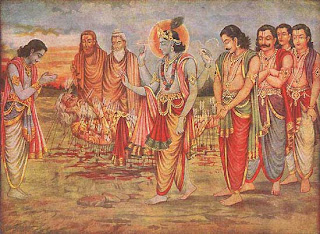
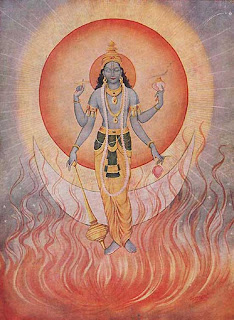
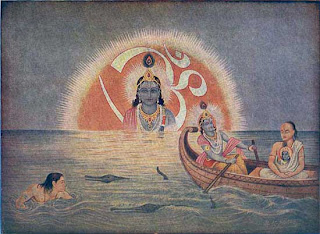
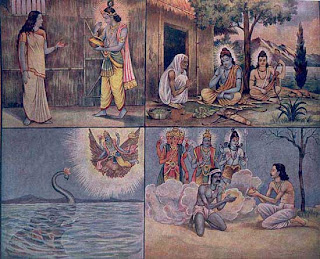
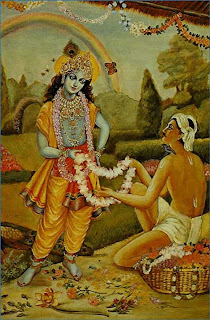










0 Response to "The Secret of Karma"
Post a Comment